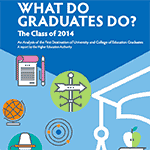 Employment opportunities for graduates of Irish universities continued to improve last year, according to a report published in May 2016 by the Higher Education Authority (HEA).
Employment opportunities for graduates of Irish universities continued to improve last year, according to a report published in May 2016 by the Higher Education Authority (HEA).
‘What do graduates do?’ is published each year and provides insights into the first destination of graduates of Irish universities and colleges of education, nine months after graduation.
The latest report looks at how 2014 graduates – from Degree, Postgraduate, Masters and Doctorate courses – have fared in relation to employment and further education.
It shows that employment rates for Honours Bachelor Degree graduates have risen significantly in recent years: from 45 per cent in 2009 to 58 per cent in 2014.
Other key findings include:
- Sixty-five per cent of all graduates are in employment, with 82 per cent employed in Ireland.
- Thirty-five per cent of Honours Bachelor Degree graduates; 14 per cent of Higher and Postgraduate Diploma graduates; and 10 per cent of Masters and Doctorate graduates are engaged in further studies / training.
- As education increases, so too does salary: over half of Honours Bachelor Degree grads earn €25,000 or over; this increases to 91 per cent for those with Doctorates with thirty-one per cent of Doctorate graduates earning over €45,000.
- At Honours Bachelor Degree level, Computer Science / ICT graduates are the highest earners, with 62 per cent earning €29,000 or more.
- Overall, there was an increase in salary for Honours Bachelor Degree graduates in 2014: 48 per cent of 2013 Honours Bachelor Degree graduates commanded an initial salary of €25,000 or more, compared to 51 per cent for the 2014 cohort. Likewise, a higher proportion (49 per cent) are earning between €25,000 and €45,000, when compared to the previous year (45 per cent). The proportions gaining initial salaries between €25,000 and €45,000 have also increased for Postgraduate Diploma, Taught Masters and Research Masters graduates.
- Dublin remains the region with most employment opportunities for graduates, followed by the South-West region.
Key Trends
Tom Boland, CEO of the HEA, said: “The findings of this report highlight many positive outcomes for graduates. Overall, employment levels – and employment in Ireland in particular – have improved from last year, and fewer graduates are going overseas for work.
“The report also shows that there are strong employment opportunities in Computer Science and ICT, with graduates in those areas reporting high levels of employment and pay.
“Finally, in relation to international students, we see larger proportions of such graduates choosing to stay in Ireland rather than move overseas, nine months after graduation. This would suggest that Ireland continues to be a popular destination of employment.”
Mr. Boland said the ‘What do graduates do?’ report provides important data on the quality of Irish higher education provision and allows Ireland to benchmark its performance internationally.
“Because of increasing higher education participation worldwide, it is imperative that we regularly assess the employability of graduates and their entry into the labour market. The high quality of our graduates is key to their success, and ours as a country, which is why we have to guard that quality zealously and resource it,” he said.
The report’s findings are based on 18,500 survey responses, representing 69 per cent of Level 8-10 graduates from Ireland’s universities and colleges of education.